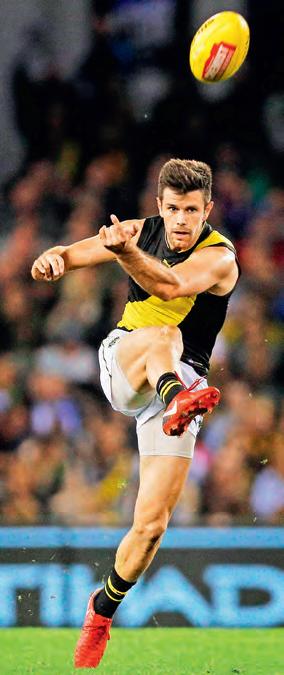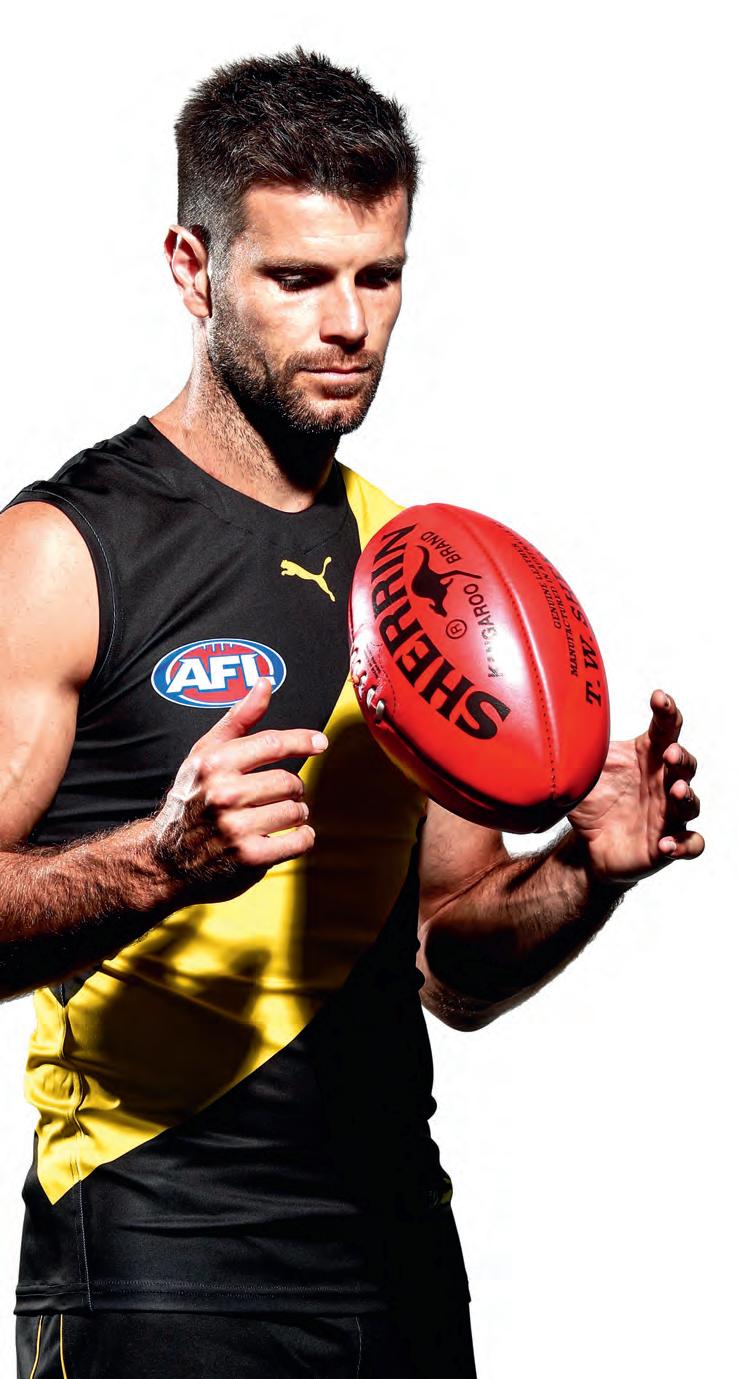
6 minute read
RARE AIR FOR TIGER TRENT
Andrew Slevison
hat more can be said or written about Trent Cotchin? In the lead-up to Cotchin’s 300th game for Richmond this week, the plaudits have come thick and fast, the superlatives have been widespread and descriptive, and it is all
His career is not yet complete, but already he is a club legend. His name stands proudly alongside some of the greatest Tigers to have pulled on the famous black with
‘Captain Blood’ Jack Dyer and Royce Hart are widely considered Richmond’s all-time best captains. But Cotchin’s name must be added to that premium, top-end echelon. Another easily identifiable Tigers great, Matthew Richardson, has little doubt Cotchin is firmly
Richardson knows a thing or two about the history of his beloved
He’s a major part of it himself, so he is well-versed to pass judgment regarding the significance of Cotchin’s career as captain.
“Royce Hart in the ’70s was up there,” Richardson told the AFL Record
“Royce didn’t play as many games, but as far as the all-time greats of the club (go) he’d
“As far as captains go, it would be Dyer, Hart and Cotchin. Only five Tigers before Cotchin – Kevin Bartlett, Francis Bourke, Dyer and premiership teammates Jack Riewoldt and Shane Edwards – have reached the celebrated 300-game milestone.
But where Cotchin stands alone is with his trio of flags (2017, 2019 and 2020) as Richmond skipper.
Cotchin is the only triple premiership captain at Richmond and is equal fourth in AFL/VFL history, behind Syd Coventry (Collingwood), Dick Reynolds
(Essendon) and Michael Tuck (Hawthorn), who led four.
When he stepped down as skipper in late 2021, he did so as Richmond’s longest-serving captain, having led the team out on 188 occasions across nine seasons.
He was thrown the captaincy at a young age (22) in 2013 and later that season led the Tigers to his first finals series.
Unsuccessful finals campaigns followed in 2014 and 2015 before a largely forgettable 2016 threatened to derail things at Punt Rd.
The next period of time changed the face of a once-powerful entity which had lost its way for near on four decades, ultimately defining Cotchin’s career.
His 2017 premiership teammate Alex Rance, who was drafted alongside the inspirational midfielder a decade earlier, saw it all play out first-hand.
Rance is acutely aware of Cotchin’s leadership credentials, but he was quick to remind us all that this man was a serious footballer in his own right, let alone a consummate captain.
During his own time in the yellow and black, Rance played next to modern day Tiger greats including Dustin Martin and Riewoldt.
Martin, in particular, is considered one of the contemporary virtuosos of our time, but Cotchin could easily hold his own in such company.
“His cleanliness and compactness was what stood out the most,” Rance said.
“Of the three greats that I played with – ‘Dusty’, Jack and Trent –Jack was the slowest to develop of that trio, whereas Dusty was an instant star.
“Dusty and ‘Cotch’ had that sort of immediate ‘wow factor’.
“They were clean and executed at a level that not many people could, they saw things not many people see.
“Through traffic and congestion they could find calm in the chaos.”
Selected with pick No. 2 in the 2007 NAB AFL Draft, it was evident from early on that Cotchin was destined for a noteworthy career.
He was a classy ball magnet with balance beyond comparison, peerless poise and composure in a class of its own.
When the club needed an overhaul, the retrospective 2012 Brownlow medallist was the first one to change his game to suit.

Rance explained in depth how Cotchin completely turned his individual output on its head for the good of the club, which helped kickstart that golden run of three flags in four years.
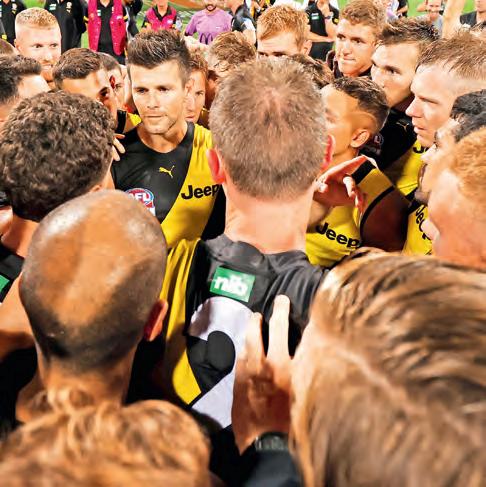
“To go from being a Brownlow medallist to a borderline blocker is a pretty humbling thing,” Rance said.
“He basically made space for Dustin and did the selfless things.
“He stood as the defensive key to our structure.
“We had a defensive spine which was Jack (Riewoldt) up forward, Trent in the middle and myself down back, with some support from Nick Vlastuin, Dylan Grimes and Shane Edwards.
“We were the central reference points, everyone else stemmed from that and if that went out of line, that’s where holes began.
“The pivotal point was Trent. In the midfield you can get very easily drawn too far forward or you can plod at the stoppage.
“He had this amazing ability to find the pivot point of where we needed to be – ‘I could get this ball, but I’m not going to, I’m going to be the defensive cover’.
“His selflessness to be able to do that from being a best and fairest winner and Brownlow medallist is a pretty amazing thing to do.
“Then you layer in all the other cultural stuff, including being able to empower others to be leaders themselves.
“It was phenomenal.”
Rance delved further into the alterations Cotchin made to his game, praising his former teammate for his ability to maximise his skills on the run in order to impact the ever-evolving AFL environment.
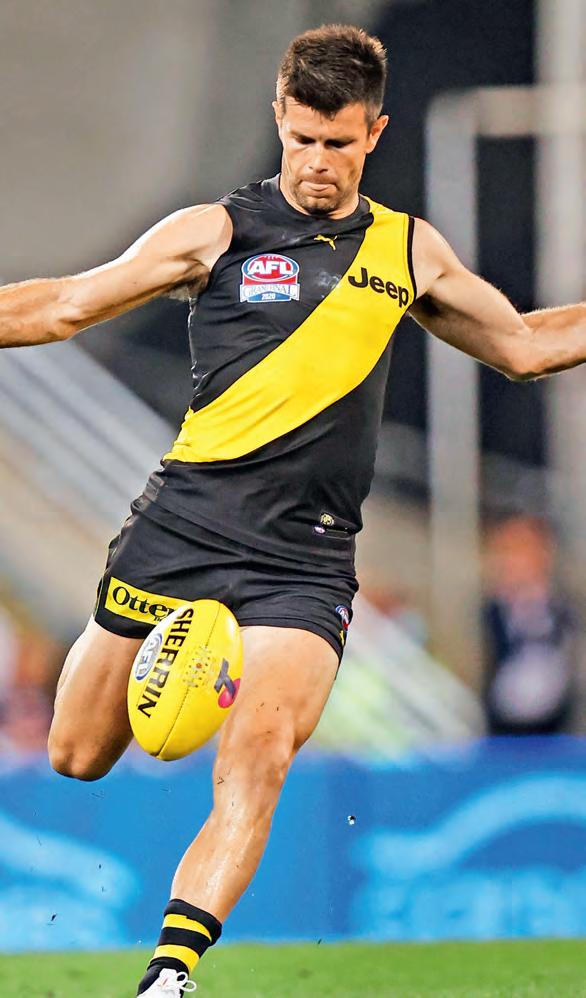
“His career, to me, had different stages,” he said.
“The first stage was just class. It was execution, it was power out of stoppages.
“The next phase was this wrecking ball of defence, putting people under pressure and hassling.
“That was what I see as his greatest attribute.
“It was post-Brownlow that that was the case. He took a step back and became this defensive beast.
“Then the last stage was even more selfless again. To be more of a director, to not taking as many balls as he probably could, spreading from a contest and releasing forward. He stood back and made sure there was defensive coverage.
“No one, in all honesty, did that defensive role as well as him. As a back six we were always really connected to the wingers and then a role called the M1, which was the one defensive mid that created a defensive pivot point in the centre of the ground.
“That role was one of the reasons why we were so successful.”
It’s difficult to quantify a legacy, and to be able to leave one, you need to have moved on.
That’s not the case yet with Cotchin, but it soon will be – just like it is now for his long-time coach Damien Hardwick, who recently called it a day at Punt Rd.
Having witnessed a bleak time at Richmond first as a supporter, then as a player, and again as a fan, Richardson attempted to evaluate what the famous No. 9 would be remembered for in years to come.
He admits he never expected to see a Tigers flag as long as he lived.
Enter Cotchin, who became one of the driving forces of a complete change in fortune.
“He was heavily involved in Richmond coming out from the abyss, from being stuck in no man’s land for 37 years,” Richardson said.
“He was the captain of that group that got it all together and put the club back where it needed to be.
“I think the two biggest names at the Richmond Football Club are Jack Dyer and Kevin Bartlett, then Francis Bourke not far behind, then this group that won three premierships with Cotchin as captain.
“For him to be captain of a team that won three (premierships) in four (years), it just absolutely turned the fortunes of the club around and got it back up as a powerhouse of this competition.
“That in itself is going to be pretty hard to beat down the line.
“I think Richmond will always be around the mark now, but is someone going to be able to be involved in an era like he has in transforming a club again? Probably not.
“So it’s a pretty huge legacy.”
PRESSURE: Cotchin became a “defensive beast” later in his career, according to Alex Rance.
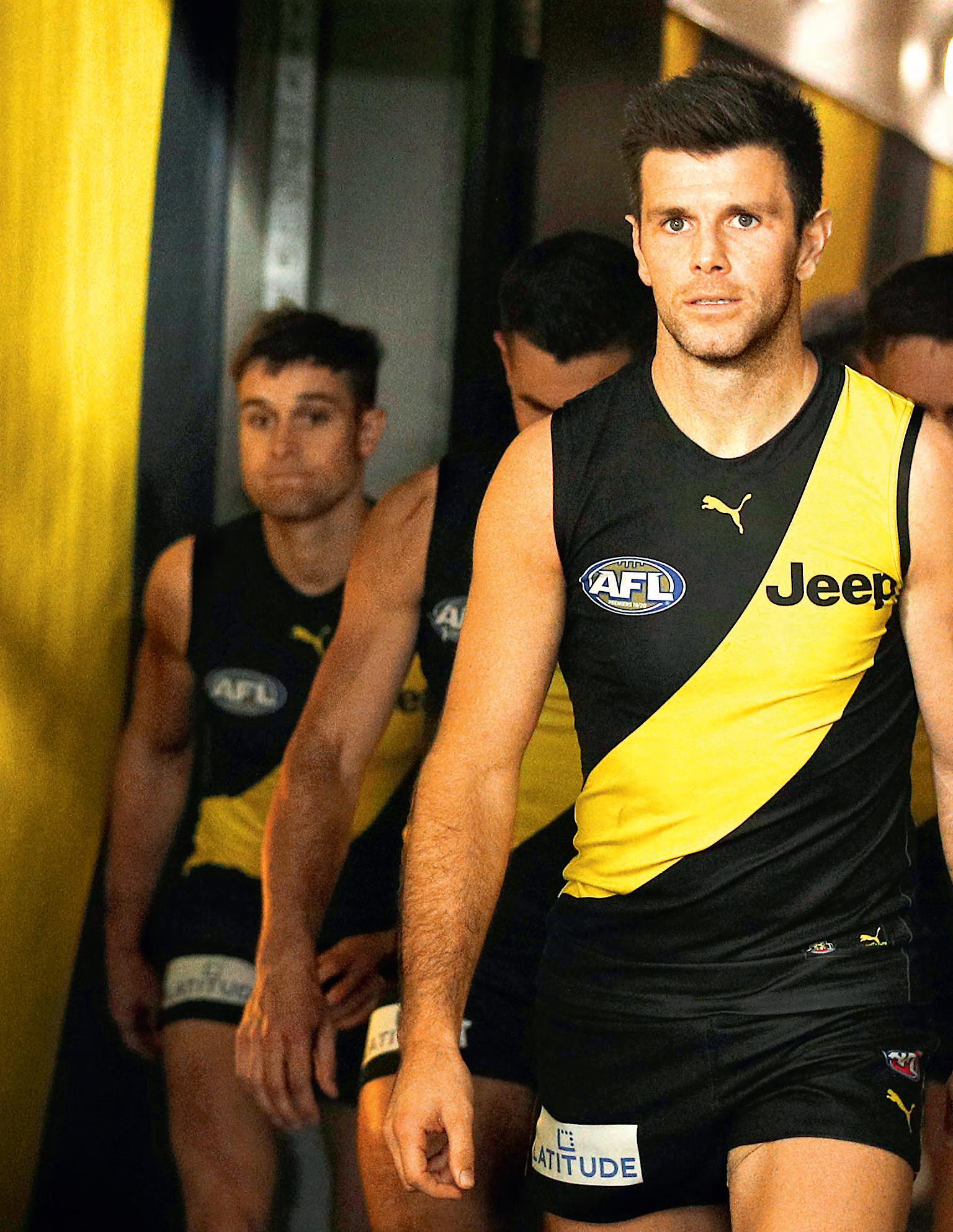
Rance firmly believes Cotchin, alongside Hardwick, introduced a new style of captaincy and coaching which continues to be used today.
“I feel like he changed the face of leadership,” Rance said.
“By extension, the Richmond Football Club played a big part in that, but he and ‘Dimma’ (Hardwick) introduced mental peak performance and vulnerability as the greatest leadership tools of the modern era.
“I really feel like Dimma and Cotch changed the face of what leadership was, of how to relate to the new generation of players coming through.
“I believe his form of leadership and his captaincy, along with the support he received from the leadership group, changed the face of leadership in the AFL.”
To play 300 AFL games is a feat in itself – it already puts a player in rare air.
To do it having captained a starving club to three premierships alongside a myriad individual accolades places you in a different stratosphere.
Whatever the future holds, the name Trent Cotchin is bound to be synonymous with the Richmond Football Club for as long as it exists.
